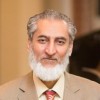Register Now and enjoy 25% off on your first 5 courses (Published Courses & Group / Batch Classes)
In the course, the following will be covered:
An introduction to the history of the Urdu language
Urdu alphabet
Basic grammar
Building vocabulary
Construction of words
Urdu syntex and the construction of sentences
Every day used phrases
Relationships, meet-and-greet, in-school, in-restaurant, on-travel related vocabulary
Situation-based conversation like shopping, eating out, traveling, etc.
Urdu is a beautiful language that is spoken by more than 200 million people worldwide in countries like Pakistan, India, Afghanistan, United Arab Emirates and other parts of the world. Urdu started developing in North India around Delhi in the 12th century. It was based on the language spoken in the area around Delhi, and was heavily influenced by Arabic and Persian as well as Turkish.
Urdu originates from Hindi, sometimes referred to as the 'sister' language of Urdu due to its grammatical basis. However, Hindi is written in 'Devanagari', a script similar to Sanskrit, and its vocabulary is influenced more by Sanskrit than by Persian and Arabic.
During the 14th and 15th centuries, a lot of poetry and literature began to be written in Urdu. Until recently, Urdu has been primarily associated with the Muslims of the Indian subcontinent, but many major works of Urdu literature have been written by Hindu and Sikh authors.
After the creation of Pakistan in 1947, Urdu was chosen as the national language of the new country. Today, Urdu is spoken in many countries of the world including UK, Canada, USA, Middle East and India. In fact, India has more Urdu speakers than Pakistan. Urdu is written from right to left like Arabic and the Urdu alphabet (38 in total) is very similar to the Arabic alphabet. Urdu poets like Iqbal, Faiz and Ghalib are famous all over the world and Urdu writers also hold a high place in the international literary world.
Urdu is a relatively easy language to learn. Apart from foreigners learning the language, many overseas-born Pakistanis are also interested in learning the language to reconnect with their cultural roots and heritage.

0 Rating